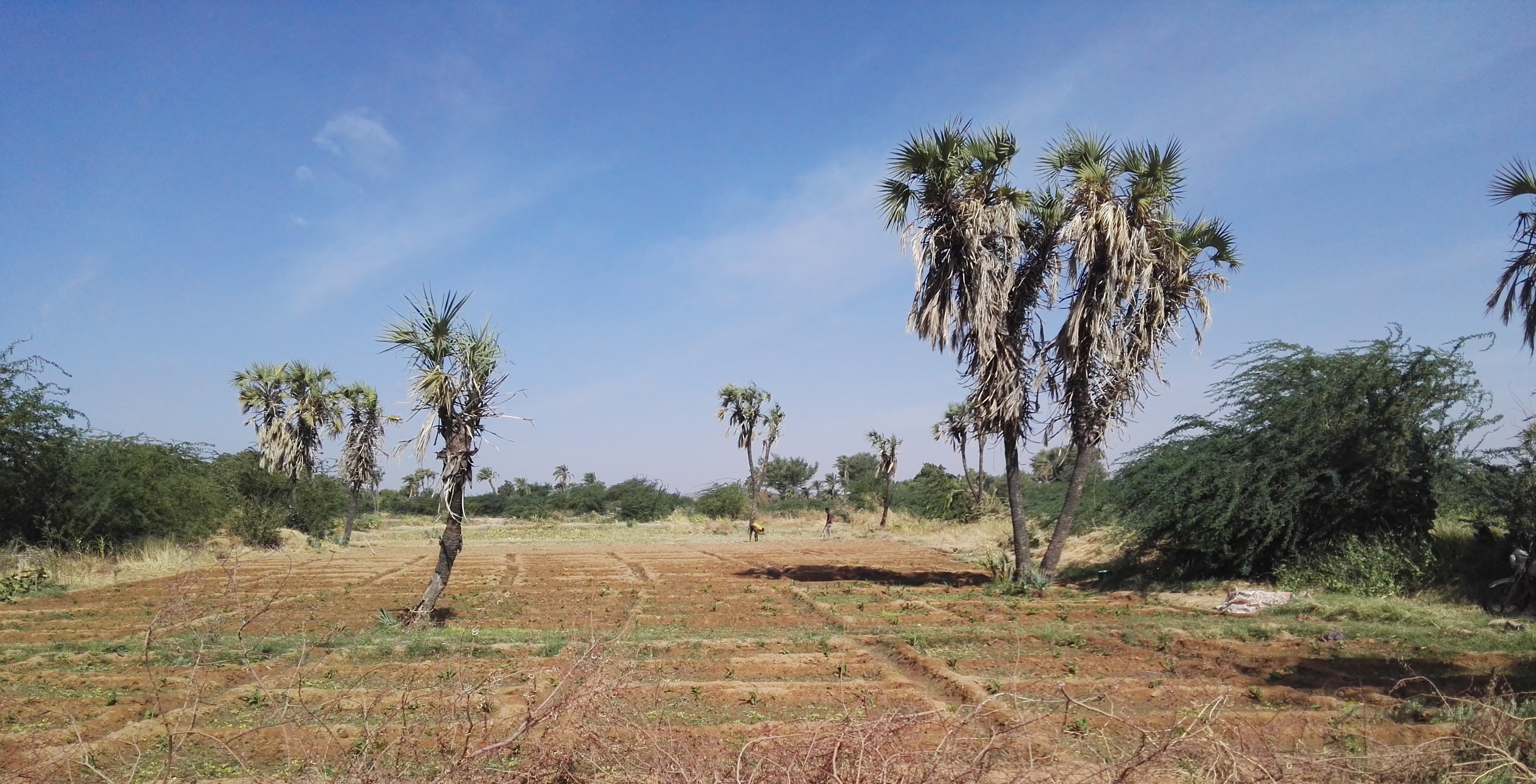
Gardens of a subsistence farmer in the Sahel
The countries of the Sahel are highly vulnerable to climate change impacts on human security, particularly food security and conflict potential. In its Fifth Assessment Report the Intergovernmental Panel on Climate Change (IPCC) underscores that simmering tensions will be intensified through shortages in food supply as well as persisting droughts. In the 1980’s the Sahel was subject to a drought period rendering entire regions dependent on food aid. Such events increase the propensity for livestock herders to mi-grate towards the more fertile sub-humid zones in the Sahel, where conflicts between this group and sedentary farmers are eminent. More than 80% of the Sahelian population works in the agricultural sector or is involved in livestock herding, underlining the potential impact of changing climatic conditions in the context of already strained resources.
This shows that climate change impacts have a clear link to security issues in the Sahel region. However, most of the existing approaches to observe the situation in this region focus single sectors (like the agricultural production, water availability or socio-economic triggered conflicts). There is no approach, which summarizes the potential for climate change triggered security aspects in the Sahel regions across sectors. With its small project “Early Warning Systems for Climate War Risks” PIK already started examining the climate change-food security-migration-conflict nexus. In this project climate impact models have been used to quantify climate change impacts on droughts and crop production failure. The results of this project combined with an in-depth analysis of several cases in the Sahel will be used to set up the early warning system.
The importance of weather analysis and water availability assessments
Based on weather data from satellites and weather stations on the ground as well as climate change projections, PIK will identify risks for water supply and low crop production as well as failures. Using evidence from previous projects, PIK will provide information of the water availability and the implications on crop growth provided by a crop-water impact model. This will help to identify drought-prone regions as well as maps for crop suitability for the case of Ethiopia and Burkina Faso. This will provide information whether traditional crop patterns are still useful under already changed climate conditions. Moreover, it will indicate whether changed climatic condition are a result that pastoralists are forced to move southwards and thus might run into potential conflicts with crop growers.
Assessing food availability and security
In a second step, PIK will use its semi-statistical impact models to identify risks for potential yield losses and failures and thus to reduced food availability and food insecurity. The statistical approaches include the in-house developed seasonal forecasting system for agricultural crop yields with the semi-statistical crop model AMPLIFY. This component will provide yield forecasts one or two months prior to the harvest. Based on the results, farmers – informed by ministries and farmers’ associations – will be able to adjust their agronomic management and thus, avert crop failures and increase farmers’ capacity to cope with climate change risks. Since the model, considers also land use, the models helps to identify production shocks, which might lead to reduced food availability and thus, causes food insecurity.
Identifying hotspots for conflicts, forced migration and food insecurity
The accumulation of the model outputs listed above allows identification of regions that will be high in crop production vs. poor production areas, as well as regions likely to become resource depleted vs. resource rich, which in turn give indication of potential conflict hot spots. However, research in the Sahel shows that the relationship between climate change, migration and conflict is very complex. Therefore, it is necessary to study government and governance structures regarding their capacity for risk assessment and risk management. This could be done on a case study basis, in which the inter-linkages between climate impacts on livelihoods, governance, inequality and resulting conflict potential can be explored. Within the project, the case studies in Ethiopia and Burkina Faso will bring food security, malnutrition, migration and conflict knowledge together. With the concise food insecurity assessment such a case study is expected to deliver robust results for future malnutrition, migration and conflict risk assessments.
What purpose does this project serve?
An early warning system can support governments in their decision making to reduce the risks of climate and weather-induced impacts on security aspects such as food insecurity, conflicts and migration. It furthermore could give an evidence-based assessment of the climate change related security risks for foreign policy formation.
What are the parameters and who is involved?
Our project partner in this endeavor is the German Federal Foreign Office. The duration of the project is aimed to be 38 months, ending in December 2021. For more detailed information on this project, please contact: Prof. Dr. Christoph Gornott (gornott[at]pik-potsdam.de).




